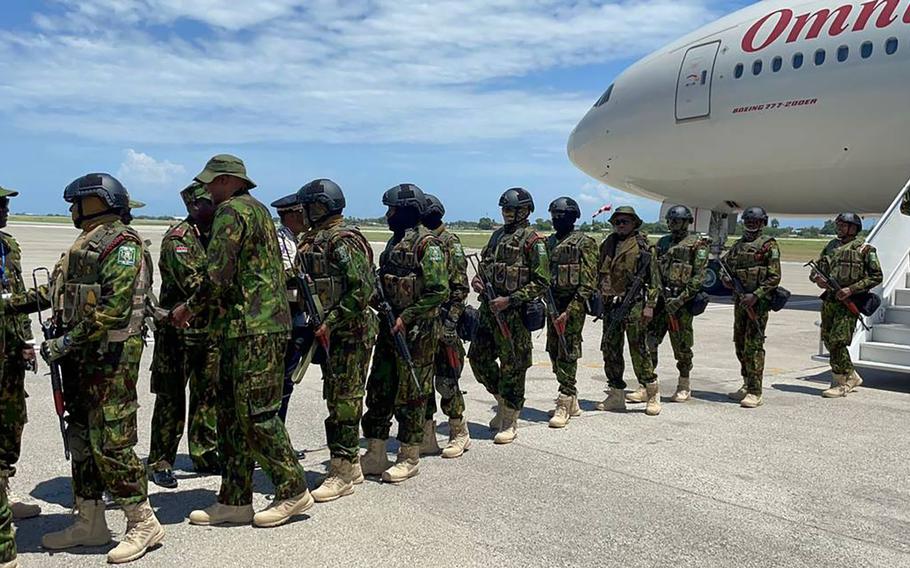
Three weeks after 200 specialized Kenyan police officers were deployed to Haiti to lead the Multinational Security Support mission, a second contingent of the same size arrived in Port-au-Prince on July 16, 2024. (Johnny Fils-Aime, Miami Herald/TNS)
(Tribune News Service) — The Biden administration is dropping its push to have the Kenya-led security mission in Haiti transformed into a formal United Nations peacekeeping operation — at least for now.
Language about any possible transformation of the struggling mission into a United Nations peacekeeping operation has been dropped from the latest draft resolution after the U.S. and Ecuador could not get support from China and Russia.
Instead, both countries will seek just the one-year renewal of the mandate of the Multinational Security Support mission, which will go to a U.N. Security Council vote on Monday. If approved the multinational force would be extended until October 2025.
During negotiations that started earlier this month, both Russia and China repeatedly opposed the inclusion of any language asking the Security Council to “begin planning to transition” the security mission into a U.N. peacekeeping operation or “to consider” the move.
The latest negotiated language, seen by the Miami Herald, instead asks that mission’s mandate, which expires on Wednesday, be extended for a year. It also encourages the mission to accelerate deployment of police officers and for the international community to step up its voluntary contributions. The lack of financial support for the mission has delayed the deployment of up to 2,500 security personnel, and affected its ability to help the Haiti National Police combat armed gangs. Almost four months after the first contingent of Kenyan police officers deployed to Haiti, there are just over 400 foreign security staffers in Haiti, including a small contingent of Jamaican soldiers.
The funding problem led the Biden administration earlier this year to pursue the peacekeeping route, because it would guarantee funding for the ill-equipped and underfunded mission. But throughout the negotiations, supporters of the move were blocked by Russia and China, permanent members of the Security Council with veto powers. The countries, which have not contributed to the current mission, argued that conditions on the ground in Haiti are not conducive for a formal U.N. peacekeeping operation and the current mission needs to first reach its full strength.
The support of the two countries has always been in doubt. Both countries have opposed past U.N. interventions in Haiti and have used the current crisis to publicly criticize the U.S. policies in the Caribbean nation.
Also, while China is the second largest financial contributor to the U.N., it has not shown interest in helping to pay for various causes around the globe. Russia, meanwhile, has repeatedly demonstrated its lack of interest in helping the U.S. deal with international problems, and Haiti is no exception.
The U.S. remains the biggest contributor to the multinational security mission, providing over $300 million, and is struggling to get other countries to contribute to a U.N. trust fund that is supposed to help finance the operations. Kenya has said the operation costs $600 million a year.
Should the current draft resolution be approved, Russia and China will be able to show support for Haiti by extending the struggling Kenya-led mission but stopping short of helping the U.S., which could once more get stuck with carrying the bulk of the financial burden for another year.
©2024 Miami Herald.
Visit miamiherald.com.
Distributed by Tribune Content Agency, LLC.